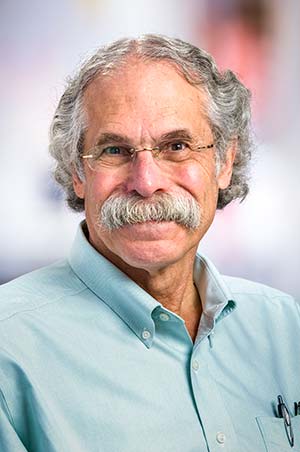David Myerson, MD
Professor Emeritus
Clinical Research Division, Fred Hutch
Dr. David Myerson is a board-certified anatomic pathologist who specializes in bone marrow transplant pathology and in using microscopy to detect, in tissue biopsies, infectious diseases that put immunocompromised patients at risk after they have received transplants. For more than four decades, Dr. Myerson’s clinical and research activities have centered on improving the diagnoses of blood disorders such as myelodysplastic syndromes and myeloproliferative neoplasms, in patients following transplantation. He has a wealth of experience in conducting research and directing clinical laboratories. He has served as lead CAP inspector, Principal Gatekeeper and Director of the Fred Hutch Tissue Repository, Co-Director of the Molecular Cytogenetics Laboratory, Director of the Hepatitis Virus Laboratory, Director of the Fred Hutch Transplant Autopsy Service, reference pathologist for Fred Hutch clinical protocols, and Scientific Review Committee member for 16+ years. Dr. Myerson is a member of US-Canadian Academy of Pathology, past-councilor and webmaster of the Pan-American Society for Clinical Virology, and past-president of the Binford-Dammin Society of Infectious Disease Pathologists. In 2014, he was recognized as a Seattle Top Doctor by Seattle Met magazine.
Other Appointments & Affiliations
Associate Professor, Pathology, University of Washington School of MedicineAssociate Professor, Pathology
University of Washington School of Medicine
Pathologist
Fred Hutchinson Cancer Center
Consulting Staff in Pathology
Children's Hospital and Regional Medical Center
Education
Damon Runyon-Walter Winchell Human Cancer Directed Fellowship, 1983
MD, Albert Einstein College of Medicine, 1979
PhD, Albert Einstein College of Medicine, 1979
ScB, magna cum laude, Brown University, 1970
Research Interests
Notably, Dr. Myerson was a pioneer in the development of chromogenic in situ hybridization procedures in tissue sections, presently used in pathology and research. More recently, has has developed combined in situ hybridization techniques designed to explore contributions of potential cells of origin. Furthermore, during the period that hepatitis C virus was first being described, he began and directed an HBV and HCV laboratory for clinical and research purposes. This led to exploration of HCV contribution to transplant complications, and ultimately to the demonstration that HCV can be cured for purposes of a marrow donor free of transmissible virus.
Current Projects
Dr. Myerson has made significant contributions to the pathology of bone marrow transplants including GVHD, and recently CAR-T cells, with studies of the skin, kidney, gut, and brain, and contributed to a NIH consensus report. He performs specialized pathology work for CAR-T/TCR protocols for proteins ROR1, WT1, CD20, and CD19, and routine pathology for BCMA; as well as specialized autopsies for transplant and immunotherapy. Retired on July 1, 2019, Dr. Myerson is now consulting for the Pathology Program, as needed.
